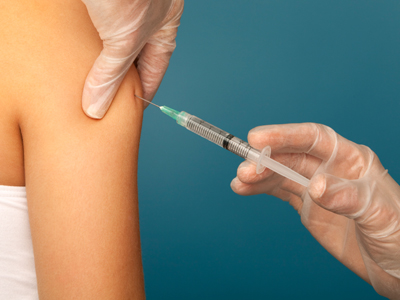
Ask the AI Tutor
Need help with Biology - Fighting Disease (AQA)? Ask our AI Tutor!
AI Tutor - Lucy
Connecting with Tutor...
Please wait while we establish connection

Vaccines cause the body to produce white blood cells to protect itself against one particular pathogen.
Biology - Fighting Disease (AQA)
Explore how your immune system, medicines and vaccination work together to fight pathogens, reduce symptoms and protect you from infectious disease.
1 .
What do vaccines contain?
Live pathogens but treated to make them harmless
Dead pathogens
Fragments of the pathogen that are harmless but which carry the antigen
Any of the above
Whichever type of vaccine is used, it causes the body to produce white blood cells to protect itself against the particular pathogen targeted by the vaccination
2 .
Why do pathogenic diseases make you feel ill?
They alter all of the chemical reactions in your body
They slow down your metabolic rate
They produce toxins and can damage cells
It is because your immune system is fighting them off
Bacteria produce toxins (poisons). Viruses reproduce inside your cells and damage them as they escape to infect more cells. It is these poisons and the cell damage that cause the symptoms of infectious diseases
3 .
Why do doctors think carefully about prescribing antibiotics?
Because they are expensive
Because they kill harmless viruses as well as pathogenic viruses
Because over use or patients who don't take the whole course can lead to the development of resistant bacteria
Because writing out a prescription for antibiotics is complicated and takes them a lot of time
The use of antibiotics has prevented many deaths from infectious bacterial diseases. New antibiotics must be developed all the time to combat the new resistant bacteria
4 .
Antibiotics are effective against what?
Bacteria only
Viruses only
Both bacteria and viruses
Neither bacteria or viruses
Antibiotics do not work against viruses because they reproduce inside cells. Any substance that destroys the virus would damage your cells too. When you have a viral infection like influenza, if your doctor prescribes antibiotics they are given to combat bacterial infections that may have arisen whilst your body is in a weakened state
5 .
Which of the following statements about the first ever antibiotic is true?
It is called pennysillyum and invented by Alexander Flaming
It is called penicillin and was discovered by accident by Alexander Fleming
It is called penicilliase and was made for use in the First World War
It is called amoxycillin and discovered by James Lister
Although Fleming discovered penicillin in 1928, he wasn't able to find anyone to help him make it. Two scientists, Florey and Chain, first produced it for testing on people in 1940 but it was several years later before a process for making it in large quantities had been found
6 .
Which of the following types of drugs is most effective against a bacterial infection?
Painkiller
Hallucinogen
Stimulant
Antibiotic
Whilst painkillers help, they treat only the symptoms and not the cause
7 .
Which of the following is not caused by bacteria or viruses?
Salmonella and listeria (food poisoning)
Cholera and typhoid
Whooping cough and sore throats
Scurvy and anaemia
Scurvy and anaemia are illnesses caused by a lack of certain vitamins and minerals in the body
8 .
Before the 19th Century, why did doctors not wash their hands in between dealing with their patients?
They did not understand about infectious diseases
They were too lazy
Soap was not available
It meant that they could move on to the next patient as quickly as possible and make more money
Bacteria and viruses were only recognised as being the cause of infectious diseases in the second half of the 19th Century. Before that, doctors did not know that disease could be passed on via dirty hands
9 .
What is a pathogen?
Someone who carries out post-mortems
A type of infectious disease
A microorganism that cause infectious diseases
A torch that surgeons wear on their heads during operations
Pathogens include bacteria, viruses, fungi and other single celled organisms
10 .
How do antibiotics work?
They absorb the toxins released by the bacteria
They kill the viruses that have got into the body
They ingest the bacteria that are causing the infection
They stop the bacteria from reproducing
That is just one of the ways they work. Penicillin destroys the cell wall of the bacteria so they literally fall apart, other antibiotics affect the bacteria's DNA and others interfere with the chemical reactions that keep the bacteria alive
**Unlimited Quizzes Await You! 🚀**
Hey there, quiz champ! 🌟 You've already tackled today's free questions.
Ready for more?
Ready for more?
🔓 Unlock UNLIMITED Quizzes and challenge yourself every day. But that's
not all...
not all...
🔥 As a Subscriber you can join our thrilling "Daily Streak" against other
quizzers. Try to win a coveted spot on our Hall of Fame Page.
quizzers. Try to win a coveted spot on our Hall of Fame Page.
Don't miss out! Join us now and keep the fun rolling. 🎉
**Unlimited Quizzes Await You! 🚀**
Hey there, quiz champ! 🌟 You've already tackled today's free questions. Ready for more?
🔓 Unlock UNLIMITED Quizzes and challenge yourself every day. But that's not all...
🔥 As a Subscriber you can join our thrilling "Daily Streak" against other quizzers. Try to win a coveted spot on our Hall of Fame Page.
Don't miss out! Join us now and keep the fun rolling. 🎉






